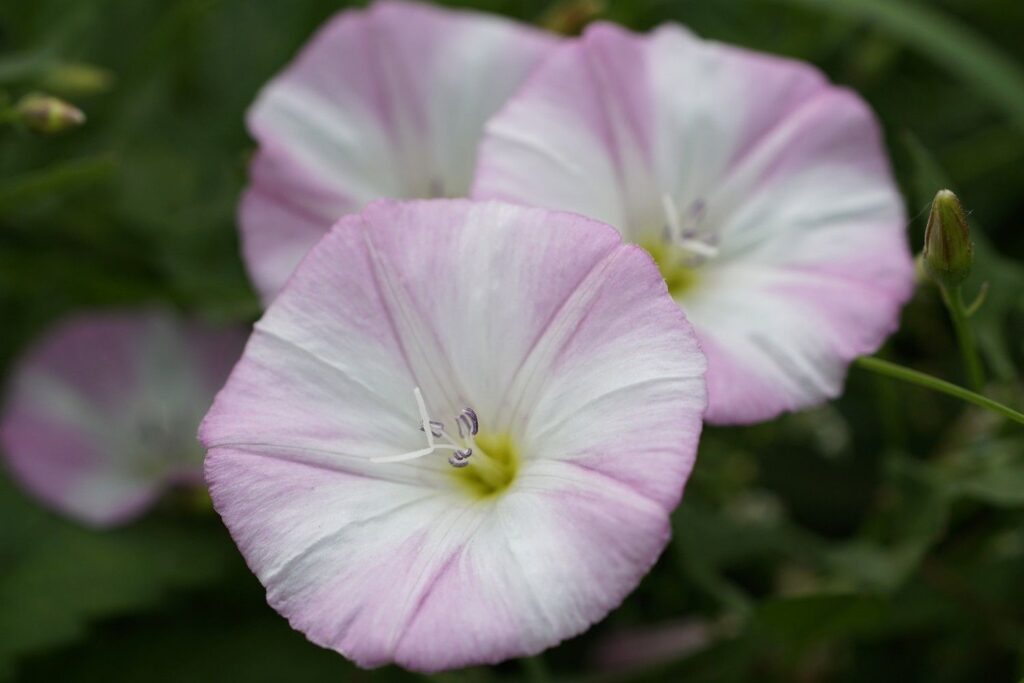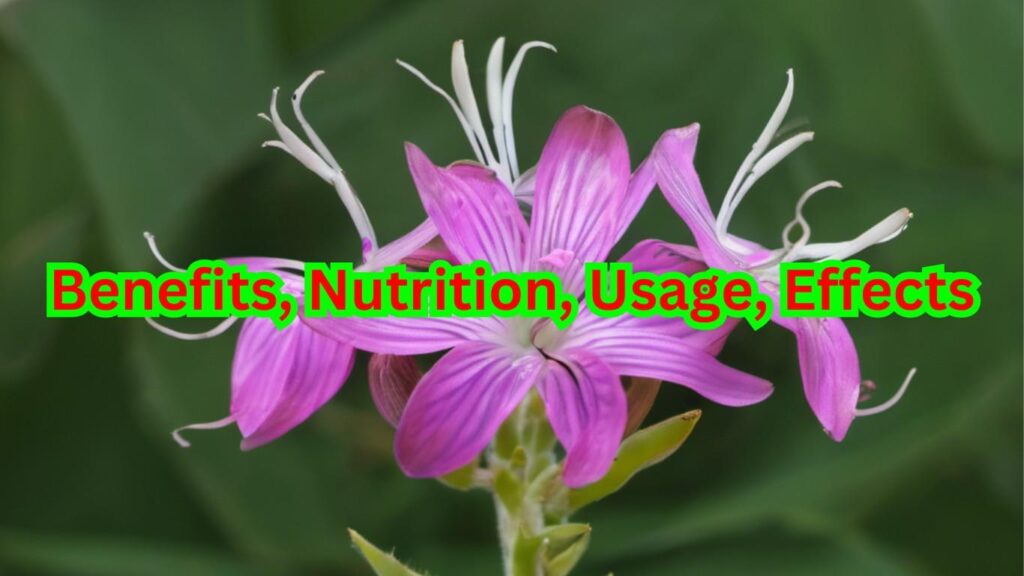Convolvulus Pluricaulis: 10 Remarkable Benefits and Potential Side Effects
Introduction
Convolvulus pluricaulis, also known as Shankhpushpi, is a popular herb in Ayurvedic medicine, primarily used to enhance mental functions and provide various health benefits. This potent herb has been valued for centuries for its therapeutic effects on both the body and the mind. In this article, we will delve into the top 10 health benefits of Shankhpushpi and explore how it can contribute to your overall well-being.
1. Enhances Cognitive Function
Shankhpushpi is renowned for its ability to enhance brain function, making it one of the most popular herbs for memory and intelligence improvement. Its use as a brain tonic has been well-documented in ancient texts. This herb works by stimulating neurotransmitters, particularly acetylcholine, which helps in faster transmission of nerve signals. This improves learning abilities, enhances concentration, and helps in better retention of information.
How It Works:
Shankhpushpi contains flavonoids, alkaloids, and glycosides, which play a crucial role in enhancing cognitive abilities. These compounds improve blood circulation to the brain, ensuring that brain cells receive sufficient oxygen and nutrients, promoting higher intellectual capabilities.
Benefits:
- Improved memory retention.
- Enhanced learning and focus.
- Better overall cognitive functioning.
2. Reduces Stress and Anxiety
Stress and anxiety are becoming increasingly common in today’s fast-paced world. Shankhpushpi acts as a natural adaptogen, meaning it helps the body adapt to stress more effectively. It works by lowering cortisol levels, which is the primary hormone responsible for stress. As a result, individuals experience a calming effect without feeling sedated.
Scientific Explanation:
The adaptogenic properties of Shankhpushpi allow it to regulate the production of stress hormones while boosting mood-enhancing neurotransmitters like dopamine and serotonin. This herb acts as a buffer against the physical and mental impacts of stress.
Benefits:
- Relief from chronic stress.
- Reduction in anxiety and panic attacks.
- Improved emotional well-being.
3. Promotes Mental Calmness
Beyond reducing stress, Shankhpushpi is known to promote mental calmness and relaxation. It soothes the central nervous system, providing relief from mental fatigue, overthinking, and irritability. For individuals who often find themselves overstimulated or unable to relax, this herb serves as a natural remedy.
How It Helps:
The calming effect of Shankhpushpi comes from its ability to balance neurotransmitter levels, such as gamma-aminobutyric acid (GABA), which helps induce relaxation. It supports deeper mental clarity while reducing hyperactivity.
Benefits:
- Alleviates mental tension.
- Helps manage irritability and restlessness.
- Fosters a peaceful state of mind.
4. Antioxidant Properties
Antioxidants are essential for combating free radicals in the body, which can lead to cellular damage and chronic diseases. Shankhpushpi is packed with antioxidants like flavonoids and phenolic compounds, which help neutralize free radicals and protect the body from oxidative stress.
Why Antioxidants Matter:
Oxidative stress has been linked to numerous health issues, including premature aging, heart diseases, and even cancer. By providing the body with antioxidant support, Shankhpushpi helps maintain healthy cells and supports longevity.
Benefits:
- Protects cells from oxidative damage.
- Slows down the aging process.
- Reduces the risk of chronic diseases.
5. Supports Heart Health and Blood Pressure Regulation
Shankhpushpi is also effective in supporting heart health by reducing blood pressure and improving circulation. Its vasodilatory effects help relax the blood vessels, ensuring smooth blood flow and reducing the strain on the heart.
How It Works:
This herb regulates lipid levels, helping to maintain cholesterol within a healthy range. It also strengthens the walls of arteries, reducing the risk of blockages, heart attacks, or strokes. Additionally, Shankhpushpi has anti-inflammatory properties that prevent damage to heart tissues.
Benefits:
- Maintains healthy blood pressure.
- Improves circulation and prevents clots.
- Strengthens heart health.
6. Enhances Sleep Quality
Shankhpushpi is widely used for improving sleep quality. Many individuals suffer from insomnia or have trouble maintaining deep, restful sleep. Shankhpushpi helps by relaxing the mind, inducing calmness, and making it easier to fall asleep.
Mechanism of Action:
Shankhpushpi acts on the nervous system to reduce overactivity and anxiety, which are often the root causes of insomnia. By lowering the levels of stress hormones and boosting the secretion of melatonin, the body’s natural sleep hormone, Shankhpushpi ensures a better and more restful sleep cycle.
Benefits:
- Natural remedy for insomnia.
- Induces deeper, uninterrupted sleep.
- Regulates sleep cycles for better rest.
7. Neuroprotective Effects
Shankhpushpi is also highly valued for its neuroprotective properties. It not only boosts mental clarity but also protects the brain from degenerative diseases like Alzheimer’s and dementia. Regular use of this herb can slow down the cognitive decline that occurs with aging.
How It Protects the Brain:
Shankhpushpi enhances the production of brain-derived neurotrophic factors (BDNF), which play a role in repairing damaged neurons and promoting the growth of new ones. Additionally, it protects brain cells from oxidative damage.
Benefits:
- Lowers the risk of neurodegenerative diseases.
- Protects against cognitive decline.
- Supports long-term brain health.
8. Boosts Digestive Health
Shankhpushpi has a mild laxative effect, which helps regulate bowel movements and support digestive health. It stimulates the secretion of digestive enzymes, making it easier to break down food and absorb nutrients.
Role in Digestion:
By promoting healthy bile production and reducing gas formation, Shankhpushpi helps prevent indigestion, bloating, and constipation. It also has mild anti-inflammatory properties that soothe the digestive tract.
Benefits:
- Regulates digestion.
- Prevents bloating and gas.
- Alleviates constipation.
9. Enhances Energy and Stamina
Unlike stimulants like caffeine, Shankhpushpi provides a sustainable energy boost that lasts throughout the day. It works by nourishing the adrenal glands and balancing energy production systems, ensuring that the body functions at optimal levels without the crash.
How It Works:
The adaptogenic nature of Shankhpushpi enhances the body’s ability to generate energy by improving mitochondrial efficiency. This means that cells produce energy more effectively, leading to enhanced stamina and reduced fatigue.
Benefits:
- Increases physical and mental energy.
- Combats fatigue without the need for stimulants.
- Improves overall stamina and endurance.
10. Supports Cellular Regeneration and Longevity
Shankhpushpi is also effective in promoting cellular regeneration, which plays a key role in overall health and longevity. It helps the body recover from injury or illness by promoting the growth of healthy new cells.
Mechanism:
The antioxidants and anti-inflammatory compounds in Shankhpushpi promote faster healing and protect the body’s tissues from damage. This herb is often used to improve recovery times and maintain a youthful appearance.
Benefits:
- Aids in the regeneration of tissues and cells.
- Speeds up recovery from illnesses or injuries.
- Promotes healthy aging and longevity.

The Following Tables May Be Useful for Your Understanding:
These tables provide detailed information on various aspects of Convolvulus pluricaulis, including its macroscopical and microscopical characteristics, chemical constituents, pharmacological activities, global common names, and nutritional composition. Reviewing these tables can enhance your understanding of the plant’s properties and its applications in different contexts.
Table 1: Visual and Physical Traits of Ethanolic Extracts
| Character | Description |
|---|---|
| Appearance | Dark brown to deep reddish-brown liquid. |
| Odor | Mild, characteristic herbal odor. |
| Consistency | Thick, syrupy texture. |
| Taste | Slightly bitter and astringent. |
Description: This table provides an overview of the macroscopical characteristics of ethanolic extracts of Convolvulus pluricaulis. The extract typically appears as a dark brown to deep reddish-brown liquid with a mild herbal odor. Its consistency is thick and syrupy, with a slightly bitter and astringent taste. These characteristics are important for identifying and assessing the quality of the extract.
Table 2: Chemical Profile of Convolvulus pluricaulis
| Constituent | Type |
|---|---|
| Alkaloids | Present, contributing to the plant’s medicinal properties. |
| Flavonoids | Include quercetin and kaempferol, which have antioxidant properties. |
| Saponins | Contribute to the plant’s adaptogenic and nootropic effects. |
| Glycosides | Contains various glycosides affecting different physiological processes. |
| Tannins | Present, providing astringent properties. |
Description: This table lists the primary chemical constituents of Convolvulus pluricaulis. The plant contains alkaloids, flavonoids, saponins, glycosides, and tannins. These compounds contribute to its medicinal effects, including antioxidant, adaptogenic, and astringent properties. Understanding these constituents helps in evaluating the therapeutic potential and uses of the plant.
Table 3: Microscopic Analysis of Leaf Extracts
| Microscopical Feature | Description |
|---|---|
| Stomata | Absent or sparse. |
| Trichomes | Non-glandular, simple or unbranched. |
| Vein Patterns | Reticulate venation visible in sections. |
| Cells | Parenchyma cells with thin walls, containing chloroplasts. |
Description: This table describes the microscopic features of ethanolic extracts of Convolvulus pluricaulis leaves. The leaves typically have sparse or absent stomata, non-glandular trichomes, and reticulate vein patterns. The cells are parenchyma with thin walls and contain chloroplasts. These details are essential for microscopic identification and quality control of the plant material.
Table 4: Pharmacological Effects of Ethanolic Extracts
| Activity | Description |
|---|---|
| Cognitive Enhancement | Demonstrates potential in improving memory and cognitive functions. |
| Anti-Anxiety | Exhibits anxiolytic effects, helping in stress and anxiety reduction. |
| Antioxidant | Shows antioxidant properties, protecting cells from oxidative stress. |
| Anti-inflammatory | Has anti-inflammatory effects that may reduce inflammation. |
| Adaptogenic | Acts as an adaptogen, helping the body adapt to stress. |
Description: This table summarizes the preliminary pharmacological activities of ethanolic extracts of Convolvulus pluricaulis. The extracts are noted for their cognitive enhancement, anti-anxiety, antioxidant, anti-inflammatory, and adaptogenic effects. These properties highlight the plant’s potential therapeutic uses in improving mental health and managing stress-related conditions.
Table 5: Names of Convolvulus pluricaulis Worldwide
| Language | Common Name |
|---|---|
| English | Shankhpushpi |
| Hindi | शंखपुष्पी (Shankhapushpi) |
| Sanskrit | शंखपुष्पि (Shankhapushpi) |
| Bengali | শঙ্কপুষ্পী (Shankhapushpi) |
| Tamil | சங்கபுஷ்பி (Sankapushpi) |
| Telugu | శంకపుష్పి (Shankapushpi) |
| Kannada | ಶಂಕಹುಷ್ಪಿ (Shankahushpi) |
| Malayalam | ശങ്കപ്പുഷ്പി (Shankapushpi) |
| Chinese | 沙参 (Shā shēn) |
| Japanese | シャンクプシュピ (Shankupushupi) |
| Korean | 샹크푸쉬피 (Syangkeupuswipi) |
| Arabic | شانكابوشبي (Shankabushi) |
| French | Shankhpushpi |
| German | Shankhpushpi |
| Spanish | Shankhpushpi |
Description: This table lists the common names of Convolvulus pluricaulis across various languages worldwide. The plant is known by different names in different regions, reflecting its broad use and recognition in traditional and herbal medicine practices. This diversity in nomenclature underscores the plant’s global significance and application.
Table 6: Nutritional and Chemical Composition
| Component | Percentage/Concentration |
|---|---|
| Water Content | 70-80% |
| Protein | 3-5% |
| Fat | 1-2% |
| Carbohydrates | 15-20% |
| Fiber | 6-8% |
| Alkaloids | Trace amounts |
| Flavonoids | Moderate levels |
| Saponins | Moderate levels |
| Tannins | Varies |
| Essential Oils | Low to moderate levels |
Description: This table summarizes the nutritional and chemical composition of Convolvulus pluricaulis. The plant is high in water content and carbohydrates, with moderate levels of protein, fat, and fiber. Alkaloids, flavonoids, saponins, and tannins are present in varying concentrations, contributing to the plant’s medicinal properties. Understanding these components helps in assessing the plant’s health benefits and nutritional value.
Side Effects:
While Convolvulus pluricaulis (Shankhpushpi) is generally safe and beneficial for most people, excessive use or certain health conditions may cause some side effects. Here are some possible side effects:
1. May Lower Blood Pressure
Shankhpushpi can naturally lower blood pressure, which can be beneficial for people with high blood pressure. However, individuals with low blood pressure might experience dizziness, weakness, or fatigue if they take too much.
2. Excessive Sedation
While Shankhpushpi helps reduce stress and anxiety, overuse can lead to excessive sedation. This can make you feel overly drowsy during the day or disturb your normal sleep cycle.
3. Digestive Issues
In some cases, Shankhpushpi may cause digestive problems for certain individuals. Excessive use might result in bloating, gas, or mild diarrhea.
4. Caution During Pregnancy
Pregnant women should be cautious when taking Shankhpushpi. Although it’s a natural herb, its effects during pregnancy are not well understood, so it’s best to consult a doctor before use.
5. Interaction with Medications
Shankhpushpi may interact with certain medications, particularly those for anxiety or depression. If someone is on these kinds of medications, they should consult a healthcare professional before using Shankhpushpi.
6. Allergic Reactions
Some people may experience allergic reactions to Shankhpushpi. Symptoms might include itching, rash, or difficulty breathing. Those with a known sensitivity to herbal ingredients should be cautious.
7. Overuse
Taking too much Shankhpushpi can counteract its benefits and may lead to physical discomfort or imbalances in the body.
If taken in the correct dosage and under the guidance of a healthcare professional, Shankhpushpi is generally safe and effective without side effects.
In conclusion, Convolvulus pluricaulis (Shankhpushpi) is a multifaceted herb with numerous health benefits. Whether you are looking to boost brain function, reduce stress, or improve your overall physical health, Shankhpushpi is a valuable addition to your wellness regimen. From enhancing mental clarity to supporting heart health, this herb offers a wide array of benefits, making it an essential part of Ayurvedic medicine.




















